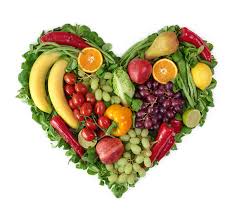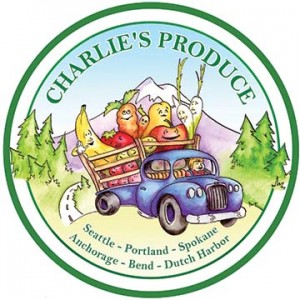To Market To Market – Charlies Produce
Produce is a hot topic these days, recalls are frequent, and people are demanding more information about how our food is grown. Having grown up on a farm, I have some of my own questions about changes in the industry. I decided to ask some questions and do some fact checking with a company that seems to be growing quickly in our area called Charlie’s Produce.
When I first noticed Charlie’s Produce I would see their trucks around town. It’s the happy round logo with animated vegetables riding in the illustrated blue truck. At that time I didn’t realize that Charlie’s Produce literally is touching almost every vegetable that I was eating whether at a store or a restaurant. Today I meet with Tygann, one of the founders’ sons, and Jeremy the General Manager close to their new warehouse, a 120,000 square foot space in Clackamas. A little background story revealed that in 1970’s, Charlie worked for another distributor of produce, but he didn’t want to answer to a boss, so he bought a truck and took to the road where he met his wife, a buyer at one of the restaurants in downtown Seattle. It’s a sweet story and it embodies a true American dream. Now the largest distributor in the Northwest, Charlie’s Produce has around 1000 employees and 18 family members helping direct the operation.
There is some concern that big distributors will put the little guys out of business, but I found out that Charlie’s Produce has a strong local vendor program where they help the farmers with crop choices, rotation and more so they can continue to supply Charlie’s with quality food that is also safe for us to eat. All of Charlie’s vendors must comply with food safety ratings or the product can’t be purchased. Charlie’s has an SQF rating which is part of an international safe quality food compliance program. The U.S. has its own program called HCAAP which ensures we can track our food, but Charlie’s Produce has gone a step up and beyond with additional certification. You may say, “So what?” Remember that recall with Earthbound Farms a few years ago? Earthbound, supplied 70% of the spinach market. The overall toll of the spinach incident was 199 people in 28 states being infected, resulting in 141 hospitalizations, 31 people having kidney failure, and three deaths. The company was brought to its knees and teetered towards financial ruin. So destroyed by this incident, the owners immediately sold the company once it had dug out of lawsuits, stabilized, and redesigned their food safety practices to become an industry leader. Small producers who don’t comply with safe food handling procedures run the risk of ruin because just one lawsuit is enough to shut the doors. This is likely a bigger threat than anything else. It will be a sad day if road side stands should go away, but many trucks that deliver produce still don’t have refrigeration and that could be a cause for concern.
Another newer demand is for people wanting to eat only local produce. Unfortunately the local supply of produce could perhaps supply 1/10th of the need especially during peak season here in Portland. For example, let’s look at strawberries. Charlie’s Produce buys as much as they can get from qualified locals who can supply 200 cases a week, demand is for 2000 cases a week in stores. California supplies most of our strawberries. It’s the same with tomatoes, where our Canadian neighbors have outshined us with state of the art hothouse systems that supply pretty much all of our tomatoes throughout the year. Jeremy says, “We really need to step up our greenhouse and hothouse growing.” I say, “Nah, it’s o.k.” You see, “I’m Canadian.”
What would our plates look like here if we only bought local, a word I personally feel is way overused and frankly tiring, but anyway… “If you’re talking about the winter months you’d better love rutabagas’, said Jeremy, or maybe, “turnip,” said Tygann. “Seriously, we are not sustainable in this marketplace; we rely on out of country and state vendors to keep everyone happy and our plates full of color.” That’s not a bad thing, but that’s the way it is. After all there are lots of businesses that produce product in Oregon and ship it outside the state. We like it when that happens and food isn’t that much different. Charlie’s Produce has over 2000 different fruit and vegetable products from around the world that it supplies to our restaurants and stores throughout the year.
Another question that comes to mind is the roller coaster pricing we see at retail locations. The produce market is based on any number of factors, the weather, water supplies and more. Charlie’s combats this with their state of the art facilities and warehouse management. Sometimes there isn’t a simple answer like when lime production failed. “When the price of limes went to a dollar a piece we had bartenders calling and asking how they would be able to make up that cost increase,” says Tygann, “Imagine, a simple lime making that big of a difference, but thankfully, it passed.” Produce pricing is very important, “It’s the least expensive thing that restaurants put on their menu they make themselves, it balances the more expensive dishes, so it’s important that the prices stay as low as possible.” says Jeremy. I had not really thought about that before, but next time I’m asking for more blue cheese crumbles. For retailers Charlie’s has other ways to help save money. For example Charlie’s has 20 banana rooms. Most stores also have their own banana room. With this addition in the new warehouse Charlie’s is now able to provide this space for customers which controls their loss and frees up space. Charlie’s can deliver so often that the bananas will almost always be perfectly ripe. Everybody wins.
Is the marketplace still competitive and what about organic? Jeremy and Tygann agree that competition is good because it spurs companies to be better than if they were the only tomato in the patch. It also encourages new markets to open up and that’s how organic produce started which is now taking over the marketplace, “We’ve had over 150% growth in this area and we see it continuing to outpace other markets,” says Jeremy. “It’s definitely something that has taken hold and something that people are willing to pay extra for. If the production can keep ahead of the market is the thing. It takes time for producers to get this certification and loads of testing to be legit; still we see this as a tremendous area for growth.”
When we had finished our lunch of you guessed it – lovely salads, I thought back to the wise woman who said, “Life is uncertain, eat desserts first,” and I thought maybe she had that wrong.



